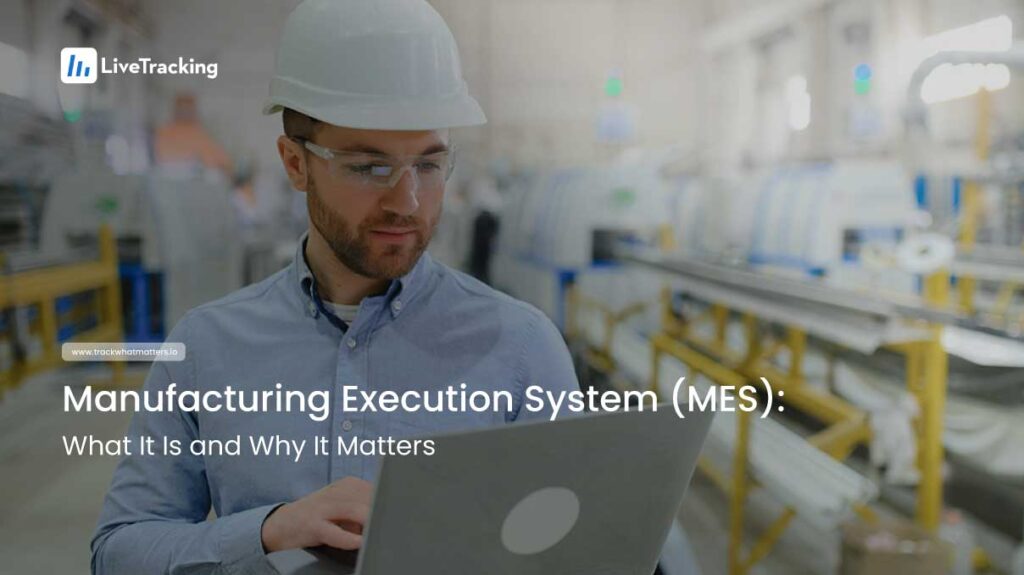Project tracking softwares Best Production Monitoring Software for Food and Beverage Industry
Project tracking software plays a pivotal role in optimizing operations within the food and beverage industry.
Project tracking software plays a crucial role in manufacturing by providing real-time data monitoring, improving decision-making, and enhancing collaboration. It serves as a bridge between ERP systems and the shop floor, offering features like automated scheduling, inventory tracking, and workflow optimization.

The evolution of project tracking software has been driven by Industry, with advancements in cloud computing, AI, and IoT. These innovations enable manufacturers to optimize their production processes, improve efficiency, and maintain compliance.
Choosing the right project tracking software involves evaluating key features, deployment options, and integration capabilities. While implementation challenges exist, best practices can ensure smooth adoption. As technology continues to evolve, project tracking software will remain essential for manufacturers striving for operational excellence.
A Manufacturing Execution System (MES) plays a crucial role in the modern manufacturing landscape. As industries evolve, the need for efficient production processes and real-time data management becomes increasingly vital. This article delves into the intricacies of MES, exploring its definition, evolution, benefits, and the factors to consider when selecting the right system for your business.
A Manufacturing Execution System (MES) is a comprehensive software solution that monitors, controls, and manages manufacturing operations on the shop floor. Its primary function is to provide real-time data about production processes, enabling manufacturers to make informed decisions that enhance productivity, quality, and efficiency.
At its core, MES serves as a bridge between enterprise resource planning (ERP) systems and the physical manufacturing process. It collects data from machines, sensors, and operators, allowing for the seamless integration of information across various levels of the organization. This integration ensures that all stakeholders have access to accurate and timely information, which is essential for effective decision-making.
The role of MES extends beyond mere data collection. It encompasses various functionalities, including production scheduling, tracking work-in-progress (WIP), quality management, and performance analysis. By centralizing these processes, MES empowers manufacturers to optimize their operations and respond swiftly to changing market demands.
Furthermore, MES plays a crucial role in enhancing communication between different departments within a manufacturing facility. By providing a unified platform for data sharing, it facilitates collaboration among teams, from production to quality assurance, ensuring that everyone is aligned with the same goals and metrics. This collaborative environment not only boosts morale but also fosters innovation, as employees can share insights and feedback that lead to process improvements.
In addition to improving internal communication, MES can significantly impact supply chain management. By offering real-time visibility into production status and inventory levels, it helps manufacturers coordinate more effectively with suppliers and distributors. This visibility allows for better forecasting and inventory management, reducing the risk of stockouts or overproduction. As a result, manufacturers can maintain a leaner operation, reduce costs, and enhance customer satisfaction by delivering products on time and in full.
The concept of MES has evolved significantly since its inception in the late 20th century. Originally, MES systems were primarily focused on data collection and reporting. However, as technology advanced, so did the capabilities of these systems. Today, MES solutions are equipped with advanced features such as real-time analytics, machine learning, and integration with the Internet of Things (IoT).
In the early days, MES was often seen as a standalone solution, but modern implementations emphasize interoperability with other systems, such as ERP and supply chain management software. This evolution reflects the growing recognition of the importance of holistic manufacturing ecosystems that facilitate collaboration and information sharing across departments.
Furthermore, the rise of Industry 4.0 has significantly influenced the development of MES. With the increasing adoption of smart manufacturing practices, MES has become a critical component in enabling manufacturers to leverage data-driven insights and automation. As a result, MES systems are now integral to achieving operational excellence and maintaining a competitive edge in the market.
One of the most notable advancements in MES technology is the incorporation of cloud computing. This shift allows manufacturers to access their MES solutions from anywhere, facilitating remote monitoring and management of production processes. Cloud-based MES solutions also enable scalability, allowing businesses to adapt to changing demands without the need for significant infrastructure investments. As a result, manufacturers can respond more swiftly to market fluctuations and customer needs, enhancing their agility and resilience in an increasingly competitive landscape.
Additionally, the integration of artificial intelligence (AI) within MES platforms has opened new avenues for predictive maintenance and quality control. By analyzing historical data and identifying patterns, AI-driven MES can predict equipment failures before they occur, minimizing downtime and reducing maintenance costs. This proactive approach not only improves operational efficiency but also enhances product quality, as manufacturers can address potential issues before they impact the final output. The synergy between MES and AI is paving the way for smarter, more efficient manufacturing processes that are better equipped to meet the demands of the future.
One of the most significant advantages of implementing an MES is the enhanced visibility it provides into production processes. By capturing real-time data from various sources, MES allows manufacturers to monitor operations continuously. This visibility is essential for identifying bottlenecks, tracking performance metrics, and ensuring adherence to production schedules. With a centralized dashboard, operators and managers can visualize key performance indicators (KPIs) at a glance, facilitating informed decision-making and fostering a culture of accountability within the workforce.
Moreover, MES enables manufacturers to respond quickly to issues that may arise on the shop floor. For instance, if a machine malfunctions or a quality issue is detected, MES can alert operators and management in real time, allowing for swift corrective actions. This proactive approach minimizes downtime and reduces the risk of costly production delays. Additionally, the system can analyze historical data to predict potential failures before they occur, allowing for preventive maintenance that keeps equipment running smoothly and efficiently.
Efficiency is further improved through the automation of routine tasks and the optimization of workflows. MES can streamline processes such as inventory management, work order generation, and quality control, reducing the need for manual intervention. By automating these functions, manufacturers can allocate resources more effectively and focus on higher-value activities that drive innovation and growth. Furthermore, the integration of MES with other enterprise systems, such as ERP and SCM, creates a seamless flow of information across departments, enhancing collaboration and ensuring that everyone is aligned with the production goals.
In addition to these operational benefits, MES also plays a crucial role in enhancing compliance and traceability. With regulatory requirements becoming increasingly stringent, manufacturers must maintain detailed records of their production processes. MES facilitates this by automatically logging data related to production runs, materials used, and quality checks performed. This not only simplifies audits and inspections but also builds trust with customers who demand transparency in the manufacturing process. By having a robust traceability system in place, manufacturers can quickly address any quality concerns and demonstrate their commitment to excellence.

1. What is project tracking software?
Project tracking software is a tool designed to help manufacturers monitor and manage their production processes, track work-in-progress, and improve operational efficiency.
2. How does project tracking software improve efficiency?
It provides real-time visibility into manufacturing operations, automates scheduling, enhances collaboration, and ensures timely decision-making.
3. What industries benefit from project tracking software?
Industries such as automotive, electronics, pharmaceuticals, and food manufacturing use project tracking software to optimize production workflows and maintain compliance.
4. What are the key features of good project tracking software?
Key features include real-time data monitoring, inventory tracking, predictive maintenance, AI integration, and cloud-based access.
5. How do I choose the best project tracking software for my business?
Evaluate factors like ease of integration, scalability, cloud vs. on-premise deployment, industry compliance, and vendor support before selecting a solution.
Would you like additional details on any section?
Share
Table of Content
Stay Up-to-Date
Get LiveTracking news in your inbox.
Error: Contact form not found.
By submitting this form I have read and acknowledged the Privacy Policy.
The latest industry news, interviews, technologies, and resources.
Project tracking software plays a pivotal role in optimizing operations within the food and beverage industry.
Project tracking softwares play a crucial role in optimizing manufacturing processes by improving visibility, efficiency, and real-time.